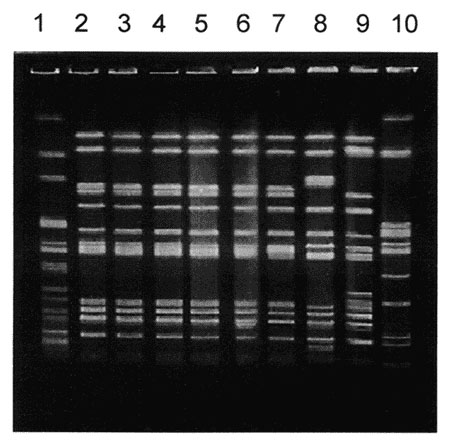Volume 6, Number 1—February 2000
Dispatch
Salmonellosis in the Republic of Georgia: Using Molecular Typing to Identify the Outbreak-Causing Strain
Figure 1

Figure 1. Pulse-field gel electrophoresis patterns of Xba I-digested DNA of Salmonella Typhimurium strains. Lane 1, Xba I-digested S. Newport control strain am01144; lanes 2 through 4, S. Typhimurium strains isolated during the first, second, and third outbreaks in Georgia, respectively; lane 5, strain 00354 (Washington isolate); lane 6, strain 01587 (Washington isolate); lane 7, 9294-99 (Maryland isolate); lanes 8, 9, and 10, genetically unrelated control S. Typhimurium strains isolated in Maryland, Washington, and the Republic of Georgia, respectively.
Page created: May 09, 2011
Page updated: May 09, 2011
Page reviewed: May 09, 2011
The conclusions, findings, and opinions expressed by authors contributing to this journal do not necessarily reflect the official position of the U.S. Department of Health and Human Services, the Public Health Service, the Centers for Disease Control and Prevention, or the authors' affiliated institutions. Use of trade names is for identification only and does not imply endorsement by any of the groups named above.